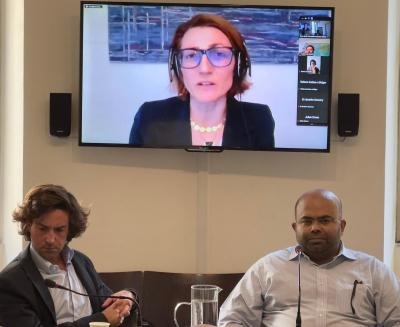New trade corridor could heighten tensions with China, experts warn

ROME -- The India-Middle East-Europe Corridor (IMEC) could increase the risk of conflict with China seeking to counter their influence, a conference at the Euro-Gulf Information Centre (EGIC) in Rome heard.
EGIC, which aims to foster political and economic alliances between Europe and the Arabian Gulf, showcased the corridor's potential to enhance economic development between India, the Middle East, and Europe. Described by EGIC as a “geopolitical pivot” the IMEC would provide links for trade routes, data, transport links as well as economic cooperation, and diplomatic engagement.
In reality, the corridor would be divided into two, the eastern section connecting India to the Gulf and the northern section connecting the Gulf to Europe. The event, moderated by EGIC Director Matthew Robinson, featured speakers Velina Tchakarova, Emanuele Rossi, and Vas Shenoy, who joined the panel in person. With increasing polarity, power struggles, and warzones in the Middle East and Europe, the speakers conveyed the potential, challenges, and viability of the corridor.
IMEC is envisioned as a counterbalance to global powers like China with India’s key role in the project emphasised due strategic location and significant population. Vas Shenoy, Chief Representative of the Italy-Indian Chamber of Commerce (ICC), explained how India has taken a tentative approach in its neutrality, aligning itself with various allies, due to its rapidly growing economy and population. This neutrality has also allowed the nation to maintain its allyship with Russia, a key military and arms supplier despite the ongoing conflict with Ukraine.
A member of I2U2 – a partnership between India, Israel, the UAE, and the US that identifies economic opportunities – India’s involvement would “futureproof supply chains” for the IMEC, according to Shenoy. As the easternmost pillar in the corridor, India could become the main supplier for Southeast Asia and the Stans, with the corridor boosting India’s strategy to escape encirclement by Beijing. Meanwhile, the UAE and Saudi Arabia embrace IMEC as part of their push to become an economic bridge between East and West.
The speakers suggested that Europe, however, has had a slightly different approach to the IMEC corridor, as they highlighted the potential key areas and the pitfalls. Velina Tchakarova, founder of For A Conscious Experience (FACE), pinpointed European hotspots Bulgaria and Romania as operational for moving goods along the future trade route.
Additionally, Emmanuele Rossi, an analyst at the Indo-Mediterranean Expert, and journalist at Formiche.net, explored Italy’s role in the future corridor. Italy’s geostrategic location in the Mediterranean, positions it to handle the trade coming in from the Gulf before transporting it to the rest of Europe. Rossi identified Trieste as one of the optimal links in Europe’s commercial and economic outreach. Due to its history of trade and proximity to major European countries, such as Germany, Austria, and Slovenia, it could stand as Europe’s southern gateway. To manage its role in diversifying IMEC’s supply chains, Rossi suggested that Italy should form a dedicated team, appointing various experts. He summarised: “Italy has a lot to give and a lot to take”.
However, with the Middle East’s ambition to move towards the global centre stage, and India’s position as a rapidly growing economy, it was suggested that Europe was actually the weakest link in the project, perhaps showing less urgency in its initiation. Additionally, the EU is not in the best geopolitical position, and a lack of comprehension is working against the strategy and creation of the IMEC.
Despite IMEC’s ambitious infrastructure plans and aims to improve political cooperation, the proposal faces potential setbacks. During the discussion, the speakers addressed various threats to the project, including emerging war zones, terrorism, and border disputes. They agreed that China's role as a global superpower, its status as the largest exporter, its large population, and its fractured relationship with Europe could pose significant threats. Additionally, the growing friendship between Russia and China, coupled with Russia's close ties to India, could complicate plans further.
Shenoy noted that the rise of extremism and terrorism, particularly from the Islamic Brotherhood, poses risks due to its proximity to India. Countries excluded from the project, such as Turkey, which is increasingly returning to its Islamic roots, have also expressed disapproval of IMEC. The two warzones that have emerged in parts of the corridor are likely to delay IMEC’s initiation, with the project's success partly depending on the normalisation of relations between Israel and Saudi Arabia to facilitate the flow of goods through the Mediterranean from Israeli outlets.
lw

© COPYRIGHT ITALIAN INSIDER
UNAUTHORISED REPRODUCTION FORBIDDEN


